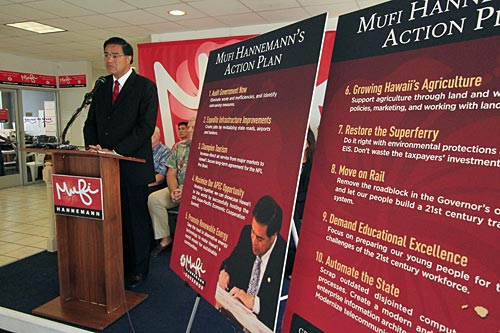Hannemann describes economic plan

Gubernatorial candidate Mufi Hannemann outlined his plan for the economy yesterday.
Former Honolulu Mayor Mufi Hannemann outlined yesterday a 10-point action plan to boost the state’s economy if he is elected governor, including an audit of state government, securing a long-term commitment from the NFL on the Pro Bowl, restoring the Hawaii Superferry and naming a work force development czar.
Hannemann also said he would continue the Lingle administration’s investments in airport, harbor and highway modernization and in alternative energy. He said the audit, similar to a review he launched for the city after being elected mayor in 2004, would be conducted by unpaid volunteers from the business, labor and nonprofit communities and would help eliminate waste and inefficiency.
"Proof in the poi is what we did with the city. We did a mayor’s review. We wrote it up. We followed through with a project management office, and the city is definitely a better place today than it was 5 1/2 years ago," he said at a news conference at his South Beretania Street headquarters.
Hannemann cited his early private-sector experience with C. Brewer & Co. for his appreciation for audits.
"I think the problem with my opponents is they haven’t spent one day in the private sector. They don’t know. And I can’t blame them for that," he said.
Former U.S. Rep. Neil Abercrombie, Hannemann’s opponent in the Democratic primary, derided Hannemann’s proposals as a series of projects that lack the substance of an economic recovery plan. He said the call for an audit, in particular, shows that Hannemann is unprepared to lead.
Don't miss out on what's happening!
Stay in touch with breaking news, as it happens, conveniently in your email inbox. It's FREE!
"The proposal for an audit isn’t action. That’s a study. That means you’re not ready to do anything," Abercrombie said. "We’re ready to go on day one. We don’t have to study anything. We’ve been listening to the people for more than a year right now, and we’ve been reflecting on what they want to do."
Abercrombie’s economic plan calls for using his relationships in Washington, D.C., to obtain more federal money for transportation, housing, health care, education, energy and environmental projects. He would create a Hawaii Energy Authority to fast-track alternative energy projects and invest in agriculture to promote locally grown food. He would also create a state Department of Early Childhood Education.
Both Hannemann and Abercrombie support the Honolulu rail project, which they believe will improve transit options for commuters, spark economic development and provide jobs.
Both candidates also back the return of the Hawaii Superferry project to link the islands. The Superferry declared bankruptcy last year after adverse court rulings over the absence of an environmental impact statement. The two high-speed catamarans built for the Superferry are now controlled by the federal Maritime Administration, which helped finance construction through loan guarantees. The state is left with $40 million in harbor improvements that will be paid by other harbor users.
Abercrombie said he doubts the Superferry could return to Hawaii without a government partner, such as the military or the state. State lawmakers rejected a bill this year that would have required the state Department of Transportation to study a statewide ferry system, perhaps by buying or leasing the Alakai and Huakai catamarans built for the Superferry.
Hannemann said he has had preliminary discussions with people interested in reviving the interisland service. His advisers described those interested in the project as "angel investors."
Hannemann said the Superferry "got off on the wrong foot" after the state exempted the project from environmental review.
Abercrombie mocked the idea of "angel investors" helping with the state’s economy. "The Superferry is a good project, but it’s not a plan," he said. "I don’t know about angel investors. If we’re going to depend on the angels for the economy, I don’t think that is much of a plan at all. It sounds more like a prayer to me."



